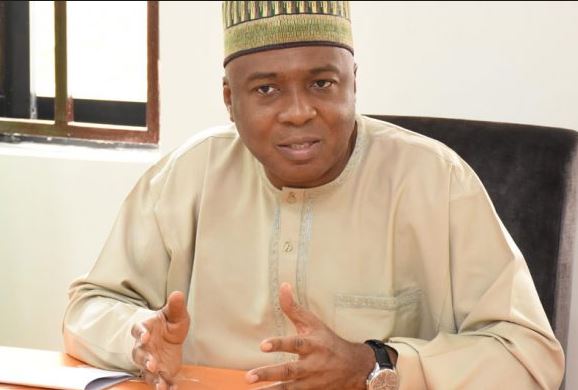Senate President Bukola Saraki has charged the national leader of the All Progressives Congress (APC) Asiwaju Bola Tinubu to dwell on facts in his criticism of the leadership of thae Senate.
Tinubu had, in a statement on Monday, defended his role in aligning with the APC in the choice of preferred candidates for the leadership of the two chambers of the federal legislature in the emerging Ninth Assembly.
The APC chieftain also knocked the leadership of the Senate for working at cross purposes with President Muhammadu Buhari on key government policies, particularly, the processing of the annual budget.
But Saraki, in a statement Abuja by his media adviser, Yusuph Oloniyonu, decried what he described as Tinubu’s “quarterly attacks” on the President the Senate.
Saraki said the APC leader’s statement contained untruth, fallacies and misrepresentations, adding that it was another effort to sell a concocted narrative about the Eighth National Assembly and its leadership.
The statement said: “First, he alleged that national budgets were delayed, distorted, padded, new projects introduced, funds for projects reduced, “to halt progress of government”.
“It is unfortunate that a man like Tinubu who had been in the Senate (though for 22 months and under a military regime) should not have a better understanding of how the legislature works.
“The passage of budgets is definitely not the exclusive responsibility of the leadership of the Senate.
“Most of the work is done by the various committees. These committees are headed by Senators representing different parties.
“It is the level of co-operation between the committees and the MDAs in the timely defence of the budget proposals and the ability of the two chambers of the National Assembly to reconcile their figures that usually determine how soon the budget is passed.
“To put the blame of budget delay on the Senate President or Speaker can only be mischief, or at best, playing to the gallery.
“It is also a known fact that any so-called delay in the passage of budgets under the Eighth National Assembly is traceable to the refusal of heads of MDAs to defend the budget proposals for their agencies on time.
“Last year, the President himself had to direct the Secretary to Federal Government to compel heads of MDAs to appear before the National Assembly committees following the report made to him by Dr. Saraki and Speaker Yakubu Dogara.
So, if a man like Tinubu is spreading this falsehood about budget passage and delay being deliberately orchestrated by the National Assembly leadership, one wonders whether he tries to even understand what happens in the federal legislature at all or is that the only thing that is of interest to him is ‘jockeying and maneuvering for influence’, as he puts it.
“To further make the points here clear, we invite Tinubu to look at the records of the time of submission of budgets and their passage since 2010 and he will see that with the exception of the 2013 budget which was passed on December 20, 2012, all the budgets have been passed between March and May of the same fiscal year.
“This should give him a better understanding of the fact that the date the Appropriations Bill is submitted to parliament and the readiness of the MDAs to defend the proposals submitted, as well as timely agreement on the figures by both chambers of the National Assembly, are the main determining factors in when the budget is eventually passed. So, Tinubu should see that the facts cannot support his spins and fake narrative”.
Saraki challenged Tinubu to cite specific instances where the Senate President and the leadership of the legislature sought to pad the budget with pet projects, as alleged.
Taking the APC leader to task about the allegation, Saraki charged Tinubu to be graceful enough to substantiate this allegation, insisting it was careless, irresponsible and callous.
Demanding that Tinubu withdraw the said statement, Saraki said it’s the constitutional responsibility of the National Assembly to review the proposals sent by the executive and where it deems necessary, it is within the power of the legislature to make changes.
